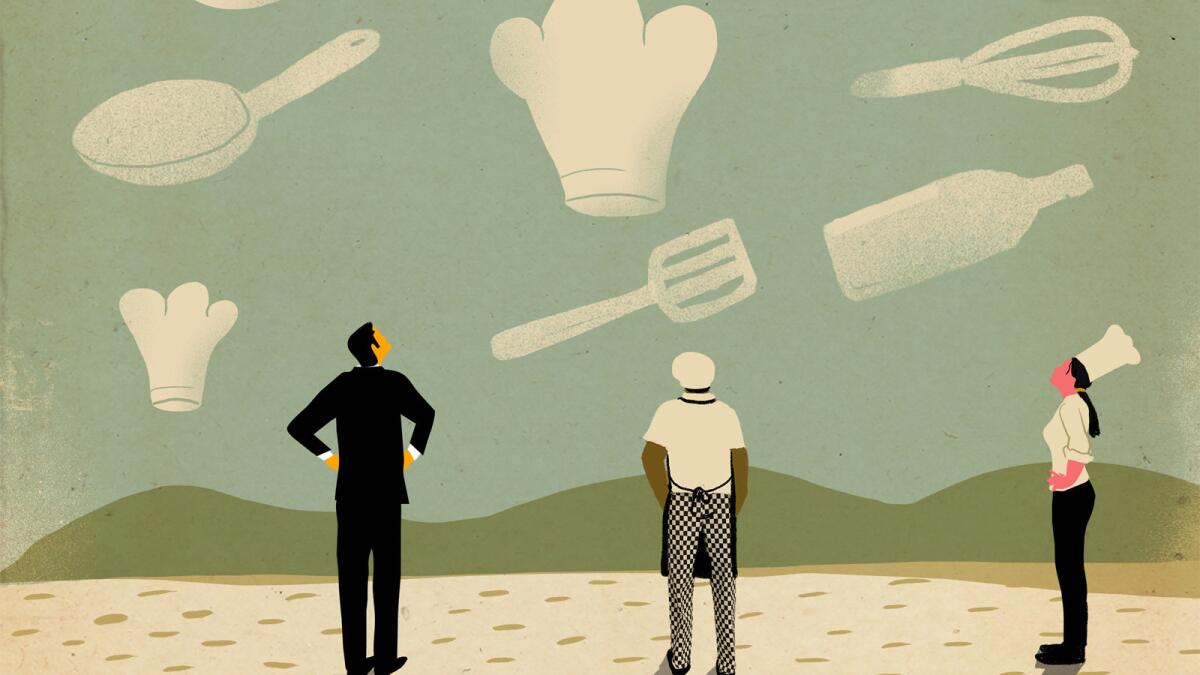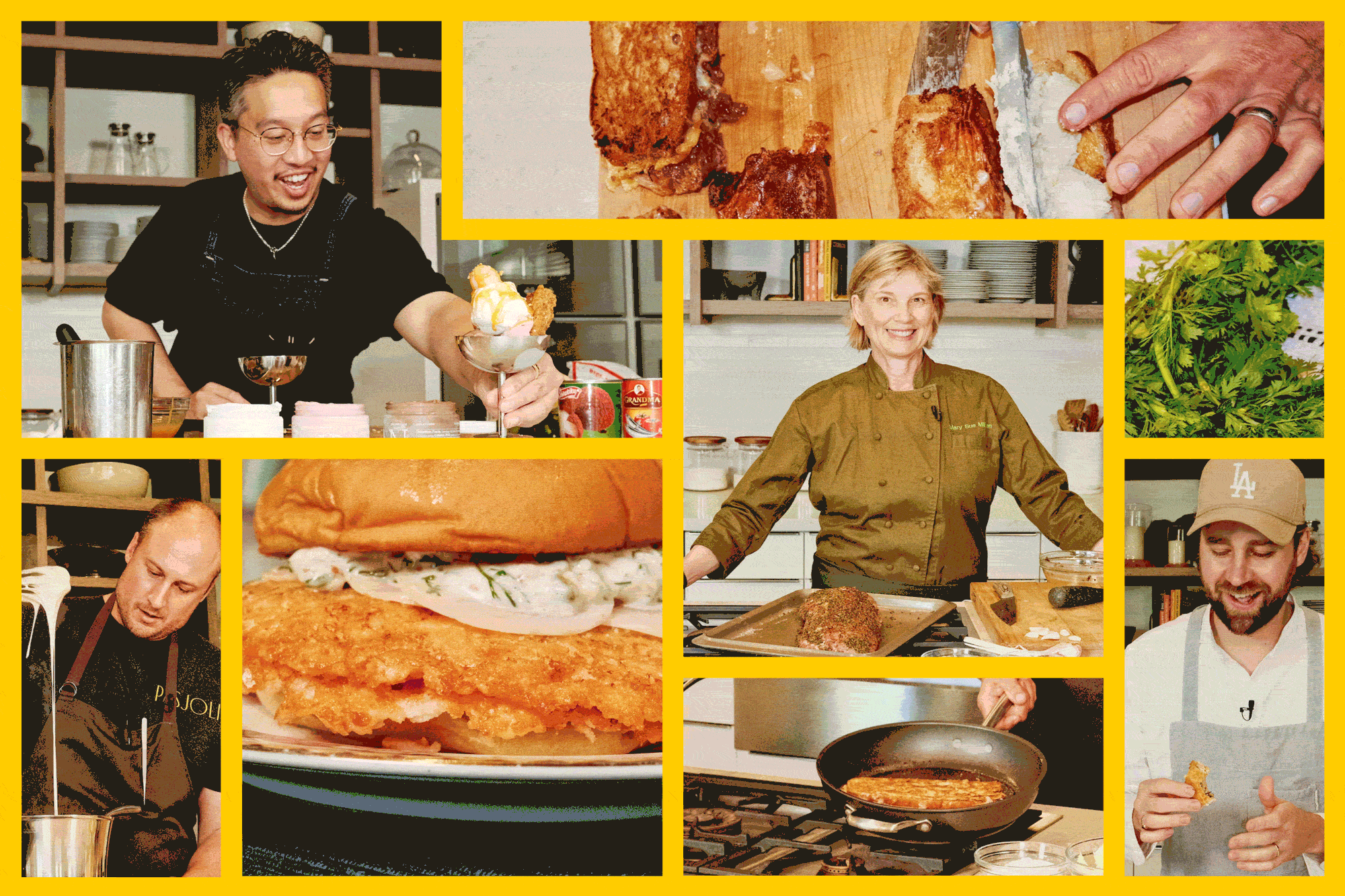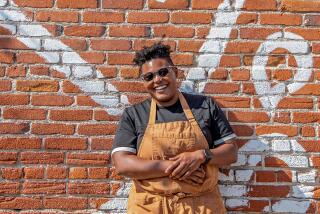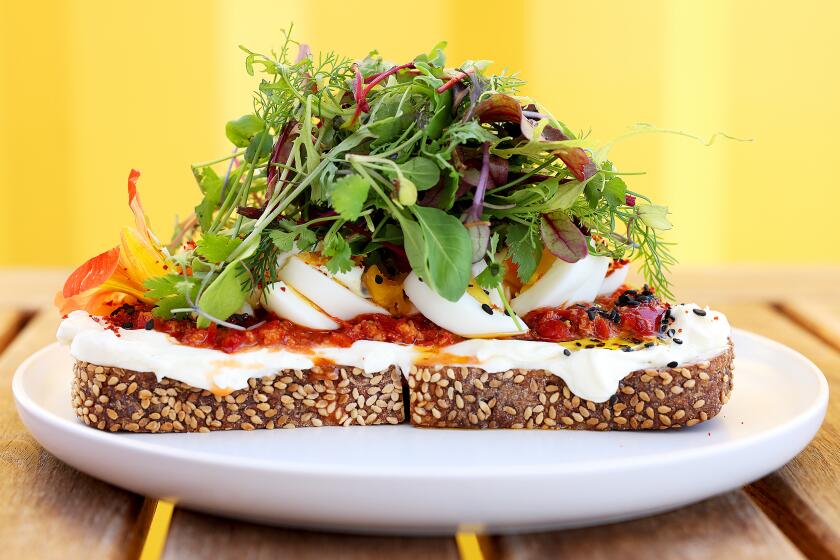Why is a good cook so hard to find these days in L.A.?

Rumors of a labor crisis in the Los Angeles restaurant industry began about four years ago as a grumble — whispering at the farmers market, the occasional kvetching on social media — but as more and more ads for line cooks go unanswered and scheduled interviews bail without so much as a call or an apology, L.A. chefs and restaurateurs are practically shouting from the rooftops: “Where are all the cooks?”
It’s a problem that began in New York and San Francisco, before spreading to Washington, D.C., and now L.A. At Michael’s in Santa Monica, assistant manager Chas McCarty will chase after anyone he sees walking down Wilshire Boulevard in chef’s whites. Clémence Gossett, who runs the Gourmandise School of Sweets and Savories in Santa Monica, fields daily phone calls from chefs and restaurateurs asking if she knows of any qualified pastry chefs. At Cosa Buona in Echo Park and Alimento in Silver Lake, chef-owner of both restaurants Zach Pollack keeps an ad for a line cook open even when his kitchens are staffed up, in hopes that the right résumé might trickle in.
A decade ago, when Pollack was a line cook at Sona, chef David Myers’ now-shuttered white tablecloth restaurant on La Cienega Boulevard, there were probably fewer than 10 ambitious restaurants in Los Angeles. “It was Sona, Grace, Spago, Lucques,” Pollack says, rattling off the restaurants that launched today’s generation of homegrown chefs, “and every line cook was competing for the same position. Now you can be late to an interview, you can make a silly comment, you can leave your knife at home” and you can still land a job. “There are just so many more restaurants,” Pollack adds, but the talent pool seems to have stayed the same.
According to the Los Angeles Health Department, there were 2,228 more restaurants operating in January 2018 than there were at the start of 2014. The data reflects the restaurant boom across Los Angeles, where out-of-town chefs are arriving in droves and new developments in Chinatown and the Fashion District are converting once-industrial blocks into culinary destinations at a breakneck pace.
The crisis comes as the restaurant scene crescendos and the public’s appetite for new openings reaches a fever pitch. At least on paper, there has never been a better time to be a cook. Opportunities abound and hazing rituals — like placing metal tongs in the oven while a cook’s back is turned, or the flinging of pots and pans by tyrannical chefs — are largely a thing of the past. In the wake of #MeToo, it’s no longer a given that female (and male) cooks will helplessly tolerate sexual harassment. A rising minimum wage and increased scrutiny around labor laws mean cooks are making more money and working less hours than ever before — and the kitchen, once a blue-collar haven for misfits, has blossomed into a glamorous profession. The possibility of celebrity lingers over every stove.
“We’ve reached a terminal velocity about how cool and rock star chef culture has become, but we can’t find chefs to execute.
— Kristel Arabian
“We’ve reached a terminal velocity about how cool and rock star chef culture has become,” says chef recruiter Kristel Arabian, “but we can’t find chefs to execute. We’ve been ready for the minimum wage hike since 2015, and really what we should have been ready for is the missing talent pool. No one is even thinking about the price yet, because we don’t have the people to give the money to.”
While a shortage of kitchen labor is a headache for business owners, the unseen consequence is actually the menus themselves. At Sona, Pollack remembers one dish that required breading and frying sweetbreads to order in a sauté pan propped up by a spoon tilting the oil to just the right angle. “Meanwhile, you’d also be frying little pieces of cornstarch-dusted tofu, heating up your dashi and you’d have a third sauté pan of crispy pigs feet going,” he remembers. “And this is while you’re getting inundated for lobster risotto. I would never in a million years ask one of my line cooks to do that today. A dish like that wouldn’t even enter the repertoire unless you had a bottomless labor pit.”
Arabian already sees restaurant menus shifting from robust ambition to standardized preparations that require less à la minute cooking. “It’s the whole sous vide thing,” she says, referring to the technique of cooking proteins in a water bath to a precise temperature before finishing them in a pan or on the grill. The results are flawlessly consistent, but they’re about as exciting as baby food, so, “why do it if it doesn’t taste as good?” she asks. “Because you don’t want to poison your clients with undercooked chicken. You either have a tiny restaurant where you are standing at the wood grill, or you sous vide it.”
One answer is to look outside the traditional talent pool of culinary school grads and aspiring celebrity chefs. Howlin’ Rays’ Johnny Zone spent 13 years working for chefs like Gordon Ramsay and Thomas Keller, but his line consists of a former Peet’s Coffee barista and an ex-con who spent seven years in prison.
“There are always guys who just think it’s too hard,” Zone says of kitchen work, “but there are always going to be people who want to improve their lives, work hard and get paid for it. How do you think people got by back in the day when no one wanted to be a chef?”
According to Arabian, the labor crunch will spawn more specialists like Zone, who focuses all his attention on Nashville-style hot chicken. “You won’t see 75 items on a menu anymore,” she says, “you’ll see 12, which makes a restaurant better anyway.” From her perspective, a labor crunch is just another hurdle in a wildly unpredictable industry. “We do this because we love the challenge,” she says. “These things happen and the good ones learn and grow -- if you stop evolving and growing in this industry, you’re dead.”
Food Bowl Alert: As part of this year’s Los Angeles Times Food Bowl, there will be an L.A. Chef’s Conference with panel discussions on how to retain restaurant employees and prevent sexual harassment; the state of fine dining in L.A.; and how restaurant reservations work in 2018. May 15, from 9 a.m. to 3 p.m., at the iPic Theatre in Westwood; the event is free.
More to Read
Eat your way across L.A.
Get our weekly Tasting Notes newsletter for reviews, news and more.
You may occasionally receive promotional content from the Los Angeles Times.










